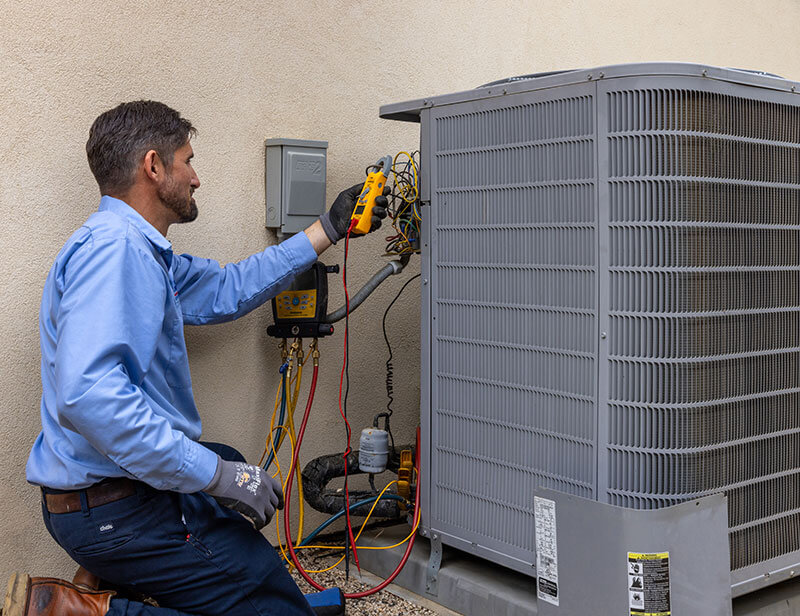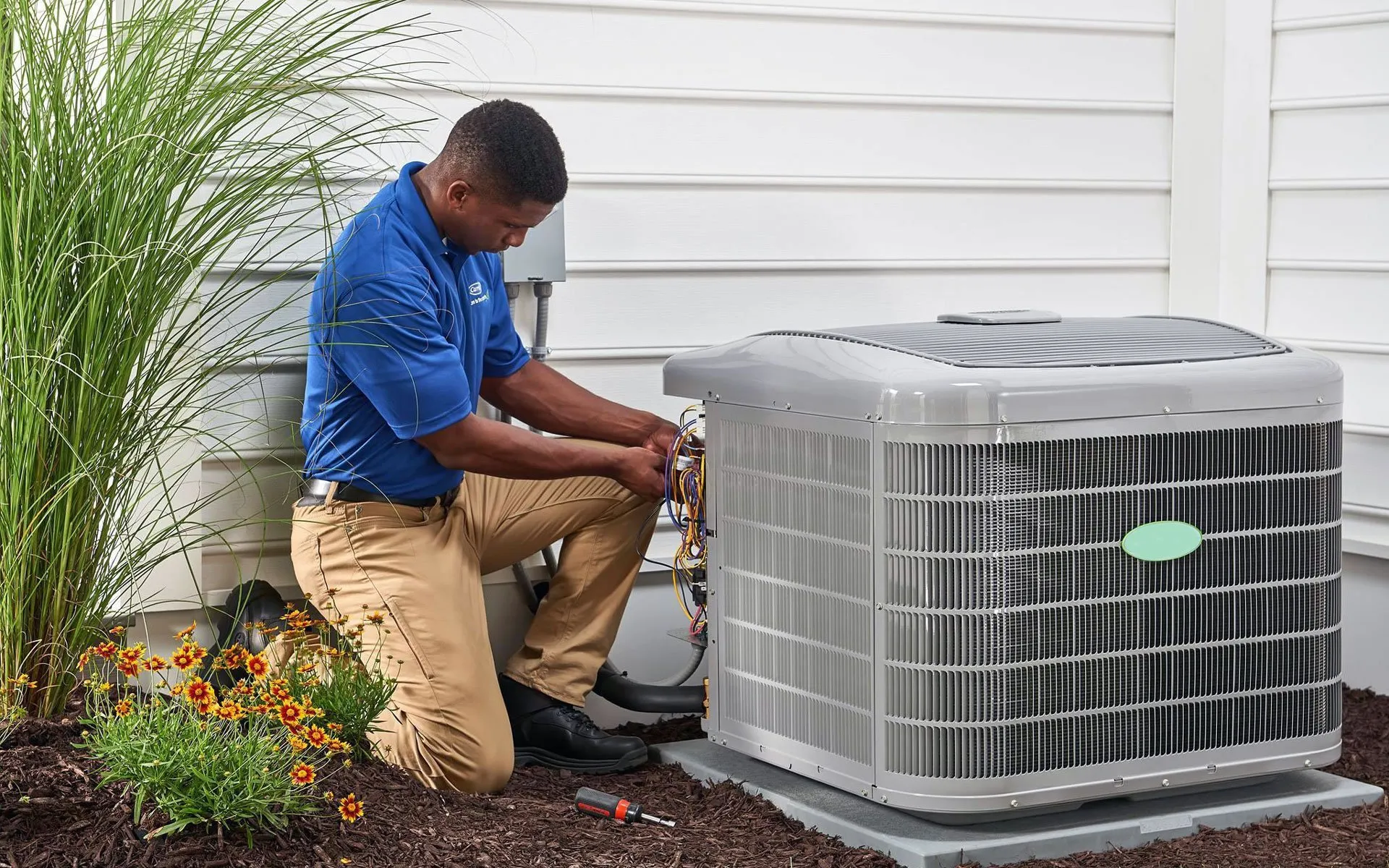Picking Between a Heat Pump and Furnace: Secret Considerations for Your HVAC Needs
When evaluating heating options for HVAC needs, the decision between a heatpump and a heater can be complicated. Each system provides distinctive advantages tailored to particular environments and energy performance objectives. Recognizing these differences is vital for making an enlightened option. Secret elements such as installment costs and environmental effect additionally complicate the selection procedure. Which option absolutely straightens with one's convenience and sustainability preferences? The complying with areas will discover these factors to consider thoroughly.
Comprehending Warmth Pumps: Exactly How They Function and Their Advantages
While many homeowners consider different heating alternatives, comprehending just how heat pumps feature and their advantages can significantly influence their choice. Warmth pumps operate by transferring warmth rather than producing it. In the winter months, they remove warm from the outside air or ground and transfer it inside your home, while in the summer season, they reverse this procedure, cooling down the home by eliminating heat outside. This double functionality makes them flexible for year-round environment control.One of the main advantages of heatpump is their power performance. They utilize significantly much less power compared to conventional heating unit, possibly resulting in lower energy expenses (heat pump installation ooltewah tn). Furthermore, heatpump have a smaller carbon impact, making them an eco-friendly selection. They also need less maintenance than standard systems, adding to lasting cost financial savings. On the whole, recognizing the mechanics and benefits of heatpump can assist homeowners make notified decisions regarding their heating and cooling needs
Exploring Heating Systems: Kinds, Operation, and Advantages
Heating systems are available in different types, consisting of gas, electric, and oil models, each with distinctive functional mechanisms. Recognizing these distinctions is essential, as they impact performance and home heating efficiency. Furthermore, heating systems supply many advantages, such as consistent warmth output and integrity in cooler climates.
Sorts of Furnaces
Heater can differ significantly in design and operation, with heating systems being a prominent selection among property owners. There are numerous kinds of furnaces, each making use of different gas resources and innovations. Gas heaters prevail, leveraging gas to produce warm efficiently. Electric heaters, on the other hand, make use of electrical resistance to create heat, typically favored for their uncomplicated setup. Oil heaters, while less usual, are reliable in areas with restricted gas access (furnace replacement). In addition, condensing heating systems maximize power efficiency by reusing and capturing exhaust gases. Each type operates with a system of warm exchangers and ductwork to disperse warm air throughout a home. Comprehending the distinctions in between these heating system kinds is important for educated heating and cooling choices
Advantages of Furnaces
For house owners looking for dependable warmth during chilly months, the benefits of furnaces are substantial. Heating systems offer consistent home heating, making sure even temperatures throughout the home. They are specifically reliable in severe cold, often outmatching warmth pumps in frigid problems. Different types, consisting of gas, electric, and oil heating systems, offer flexibility to fulfill varied needs and preferences.Furnaces additionally tend to have lower preliminary installment expenses compared to heatpump, making them an extra obtainable choice for several. Their durable style contributes to a longer lifespan, with several devices lasting over 15 years with appropriate upkeep. Additionally, modern heaters are frequently geared up with advanced technology for enhanced performance, which can cause decreased energy bills. On the whole, heaters stay a reliable option for reliable home heating.

Energy Effectiveness: Comparing Warmth Pumps and Furnaces
When comparing energy performance between heat pumps and heating systems, the Seasonal Energy Performance Ratio (SEER) plays a crucial function in figuring out performance. Additionally, an operational expense analysis exposes the long-lasting financial ramifications of each system. Recognizing these elements can assist house owners in making informed choices about their heating services.
Seasonal Energy Efficiency Ratio
Power efficiency plays a vital duty in the decision-making procedure in between heatpump and furnaces, particularly when taking into consideration the Seasonal Power Effectiveness Ratio (SEER) This statistics actions the cooling efficiency of heatpump over an entire air conditioning period, providing a standard way to assess performance. Higher SEER ratings show better power performance, converting to reduced energy intake and decreased utility bills. In comparison, furnaces are normally examined utilizing the Yearly Gas Use Effectiveness (AFUE) ranking, which mirrors home heating efficiency. When comparing these 2 systems, house owners ought to prioritize SEER rankings for heatpump, as they directly influence overall energy financial savings and environmental sustainability. An extensive understanding of SEER can go to my blog significantly influence the lasting fulfillment and cost-effectiveness of the selected heating and cooling solution.
Functional Cost Evaluation
Understanding the operational expenses related to heat pumps and heaters is vital for property owners reviewing their options. Warm pumps generally use greater power efficiency, converting electric power into warmth with minimal waste. This causes lower regular monthly energy bills, specifically in modest environments. On the other hand, standard furnaces, especially gas models, may have reduced upfront prices yet can incur greater functional expenses over time due to sustain prices and efficiency ratings.Moreover, warm pumps can operate as both heating and cooling systems, potentially reducing the requirement for different heating and cooling units. While first financial investments for warm pumps may be greater, their long-term financial savings in power performance can make them a much more cost-efficient choice for lots of homes. Mindful analysis of neighborhood energy prices is important to identify the best option.
Installation Costs: What to Expect for Each Heating System
Setup prices for furnace can vary significantly between heatpump and furnaces, influencing house owners' decisions. Warmth pumps usually have greater ahead of time installation prices, generally ranging from $3,500 to $8,000, depending on the unit size and intricacy of setup. This includes the outside unit, interior handling system, and required ductwork modifications. Alternatively, furnaces often tend to have reduced preliminary costs, averaging in between $2,500 and $6,000, which can be appealing for budget-conscious house owners. Installation expenses can raise if extensive ductwork is required.Moreover, the selection of gas kind for heaters-- all-natural gas, lp, or electrical-- can likewise affect installation prices. While heatpump provide power effectiveness, their initial financial investment might discourage some purchasers. Inevitably, reviewing setup prices together with long-lasting cost savings and performance will certainly aid property owners in making notified choices concerning their heating unit.
Environment Considerations: Which System Performs Much Better in Your Location
Exactly how do climate problems affect the performance of heater? The efficiency of heatpump and furnaces can vary considerably depending upon the neighborhood environment. In modest climates, warm pumps succeed by successfully transferring warm from the outside air, making them an energy-saving alternative. Their performance lessens in exceptionally chilly temperatures, where they might struggle to extract adequate warmth. Conversely, furnaces, particularly gas versions, offer reputable and constant warm no matter of outdoor problems, making them more effective in chillier regions.In locations that experience milder winters, warmth pumps can run efficiently year-round, offering both cooling and heating. In comparison, regions with extreme winters months typically take advantage of the robustness of heaters. Inevitably, understanding the regional environment is necessary when choosing in between a heat pump and a furnace, as it directly affects their functional effectiveness and overall performance.
Upkeep Needs: Long-Term Look After Warmth Pumps vs. Furnaces
While both heatpump and furnaces need routine upkeep to assure peak efficiency, their specific requirements and care routines vary significantly. Heaters generally require less frequent attention, with annual assessments being adequate to look for gas leaks, clean filters, and examine general performance. Their less complex layout typically permits straightforward repairs.In comparison, warm pumps require semiannual upkeep due to their dual role in heating & cooling. This includes cleaning coils, inspecting cooling agent degrees, and ensuring that both the indoor and exterior units work at their finest. Furthermore, heat pump maintenance typically involves more complex components, making expert maintenance essential.Neglecting upkeep can result in decreased performance and boosted energy costs for both systems. Eventually, house owners ought to take into consideration these lasting treatment requirements when picking between a warm pump and a furnace, as positive upkeep can expand the lifespan and efficiency of either system considerably.
Ecological Influence: Selecting a Sustainable Heating Alternative
The ecological impact of furnace is a vital examination for house owners looking for lasting choices. Heatpump are typically extra energy-efficient than typical heaters, as they move warm rather than create it, greatly minimizing carbon emissions. By using renewable resource sources, such as air-source or geothermal warm pumps, house owners can additionally decrease their eco-friendly footprint.On the other hand, natural gas heaters send out greenhouse gases and add to air pollution, though they frequently official statement give higher warmth outcome. Developments in technology have led to the growth of high-efficiency heating systems that reduce emissions.Ultimately, choosing a heating system involves considering effectiveness versus ecological influence. Home owners are urged to show on local energy sources and incentives for renewable systems, making certain a choice that lines up with both personal comfort and ecological obligation. The decision affects not only prompt comfort however also lasting sustainability why not check here and ecological health.
Often Asked Questions
The Length Of Time Do Warmth Pumps and Furnaces Commonly Last?
The life expectancy of heat pumps normally ranges from 15 to two decades, while furnaces can last between 15 to three decades. Regular maintenance significantly affects their longevity and performance in providing heating remedies.
Can I Utilize a Heat Pump in Exceptionally Cold Climates?
Heatpump can run in extremely chilly environments, yet their performance reduces as temperature levels decline. In such conditions, supplemental heating resources may be needed to keep comfy interior temperatures and ensure peak efficiency.

What Is the Sound Degree of Heat Pumps Versus Furnaces?
The noise levels of warm pumps and heaters vary considerably. Typically, heatpump run more silently than conventional furnaces, making them more suitable for those sensitive to appear, while furnaces might create louder operational sounds during home heating cycles.
Are Warm Pumps Suitable for Both Heating and Cooling?
Heatpump are without a doubt appropriate for both home heating and air conditioning (heat pump service). They operate by moving warm, offering efficient temperature control year-round, making them a flexible selection for house owners looking for an all-in-one cooling and heating remedy
What Size Heater Do I Required for My Home?
Determining the ideal size furnace for a home requires assessing factors such as square video, insulation high quality, regional environment, and the home's format. Consulting a professional can ensure an accurate evaluation and excellent convenience. Heat pumps usually offer greater energy effectiveness, transforming electric power right into warm with marginal waste. In modest environments, heat pumps stand out by successfully moving warmth from the outside air, making them an energy-saving choice. Alternatively, heaters, particularly gas designs, provide constant and trusted heat regardless of outside conditions, making them more effective in chillier regions.In locations that experience milder winters months, warm pumps can operate properly year-round, providing both heating and cooling. Warmth pumps are usually more energy-efficient than traditional furnaces, as they move warmth instead than produce it, significantly decreasing carbon exhausts. By using sustainable power resources, such as air-source or geothermal warmth pumps, house owners can even more reduce their ecological footprint.On the other hand, all-natural gas heating systems release greenhouse gases and contribute to air contamination, though they frequently supply higher warmth result.